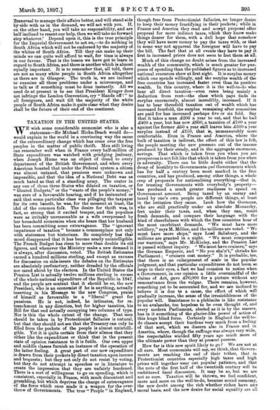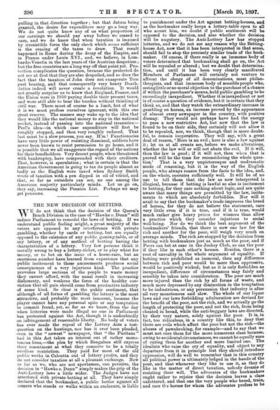TAXATION IN THE UNITED STATES.
WE wish some considerable economist who is also a statesman—Sir Michael Hicks-Beach would do— would explain to the world in a convincing way the cause of the extraordinary change which has come over the free peoples in the matter of public thrift. Men still living can remember well when in France every half-million of State expenditure was watched with grudging jealousy, when Joseph Hume was an object of dread to every department of the British Government, and when every American boasted that under the Federal system a citizen was almost untaxed, that pensions were unknown and impossible, and that the idea of a National Debt was as much hated as that of a standing army. The orator in any one of those three States who dilated on taxation, or " bloated Budgets," or the "waste of the people's money," was sure of a favourable hearing, and if he insinuated or said that some particular class was pillaging the taxpayer for its own benefit, he was, for the moment at least, the idol of the common folk. The desire for thrift was, in fact, so strong that it excited temper, and the populace were as irritably unreasonable as a wife overpressed by her household economies when she hears that her husband has been committing some extravagance. The " ignorant impatience of taxation " became a commonplace not only with statesmen but historians. So completely has that mood disappeared that it has become nearly unintelligible. The French Budget has risen to more than double its old figures, and whenever the Ministry make a new demand it is always, after discussion, voted. The British Estimates exceed a hundred millions sterling, and except as excuses for discussion on side-issues the debates on the Estimates are absolutely perfunctory, neither dreaded by the officials nor cared about by the electors. In the United States the Pension List is actually twelve millions sterling in excess of the whole national expenditure of the Republic in 1847, and the people are content that it should be so, the new President, who is an economist if he is anything, actually inserting in his Message to the new Congress, praise of himself as favourable to a "liberal" grant for pensions. He is not, indeed, he intimates, for re- trenchment in any direction, but for higher taxation, his Bill for that end actually occupying two columns of type. Nor is this the whole extent of the change. That men should be taken in by Protectionist fallacies is natural, but that they should not see that the Treasury can only be filled from the pockets of the people is almost unintelli- gible. Yet it is quite certain from their silence that they either like the expenditure or think that in the present state of opinion resistance to it is futile. Our own upper and middle classes furnish an instance of the operation of the latter feeling. A great part of our new expenditure is drawn from their pockets by direct taxation upon income and bequests; but they not only do not resist by voting, but they do not attempt in speeches or in literature to create the impression that they are unfairly burdened. i There is a sort of willingness to go on spending, which is consistent, especially in France, with much discontent and grumbling, but which deprives the charge of extravagance of the force which once made it a weapon for the over- throw of Governments. The true " People " in England, though free from Protectionist fallacies, no longer desire to keep their money fructifying in their pockets; while in France and America they read and accept proposal after proposal for more indirect taxes, which they know make things dearer for them, with a dull hope that somehow they will have more money to pay the taxes with, or that in some way not apparent the foreigner will have to pay the bill. The fact that at all events they have to pay it first in increased prices does not seem to fret them at all.
Much of this change no doubt arises from the increased wealth of the community, which is much greater for pur- poses of spending than the published figures as to increased national resources show at first sight. It is surplus money which one spends willingly, and the surplus wealth of the free countries has increased faster even than its positive wealth. In this country, where it is the well-to-do who bear all direct taxation—even rates being mainly a deduction from rent—the class which pays finds its surplus enormously, almost incredibly, increased. If it has to bear threefold taxation out of wealth which has increased fourfold, the surplus remaining after necessities are paid for has increased perhaps five or six fold. Say that it takes a man £200 a year to eat, and that he had £400 a year, but has now £800, a taxation of £100 a year against the former ..t50 a year still leaves him £500 a year surplus instead of £150, that is, immeasurably more comfortable. Even in France and America, where the bulk of taxation is indirect, the effect of this law is felt, the people meeting the new pressure out of the income produced by their steady, and in the aggregate enormous, savings. That which is taken from you when you are prosperous is not felt like that which is taken from you when in adversity., There can be little doubt either that the decay of hostility to Governments pad Governments which has for half a century been most marked in the free countries, and has produced, among other things, a whole crop of proposals for nationalising everything—that is, for trusting Governments with everybody's property— has produced a much greater readiness to spend on Government account. Being taxed by an enemy and taxed by one's own people are different things, at least in the irritation they cause. Look how the Germans, who are still practically under an absolute Monarchy, fret under their taxes, and, when they can, resist fresh demands, and compare their language with the kind of cheerfulness with which the free countries hear of the most exorbitant demands. " We must have more artillery," says M. 3110ine, and the millions are voted. " We must have more ships," says Lord Salisbury, and the millions are granted in a night. " We must compensate our warriors," says Mr. McKinley, and the Pension List is passed without inquiry. " We must have cruisers," says the German Emperor, and "No you sha'n't," shrieks his Parliament ; " cruisers cost money." It is probable, too, that there is an enlargement of scale in the popular judgment, and that particular expenditures do not loom so large in their eyes, a fact we had occasion to notice when a Government, in our opinion a little overmindful of the claims of Art, gave £70,000 for a picture without any remonstrance from the vulgar. There remains, however, something yet to be accounted for, and we are inclined to believe it is due to a cause, the effect of which will gradually increase, the sense of the irresistibleness of the popular will. Resistance to a plebiscite is like resistance to an avalanche, too hopeless to be even thought of, and every modern Parliament, elected as it is by the masses, has in it something of the glacier-like power of action of this huge blind force. Certainly in England the well-to- do classes accept their burdens very much from a feeling of that sort, which we discern also in France and in America, where, though the suffrage was always very wide, the respectables wielded fifty years ago much more of the ultimate power than they at present possess. How far is this new spirit likely to go ? We are not at all sure. Most economists will say, we think, that Govern- ments are reaching the end of their tether, that in Protectionist countries especially high taxes and high prices will together wear out popular patience, and that the note of the first half of the twentieth century will be embittered fiscal discussion. It may be so, but we are not so sure. Taxation will be thrown, we feel confident, more and more on the well-to-do, because sound economy, the new doubt among the rich whether riches have any moral basis, and the new desire for social equality are all pulling in that direction together ; but that datum being granted, the desire for expenditure may go a long way. We do not quite know any of us what proportion of our earnings we should pay away before we ceased to earn, and we do know that when taxation is imposed by irresistible force the only check which seems sufficient is the ceasing of the taxes to draw. That result happened in Rome during the decay of the Empire, and in France under Louis XVI., and, we believe, in Lom- bardo-Venetia in the last years of the Austrian despotism ; but the free countries are a long way off that point yet. Pro- tection complicates the question, because the protected do not see at first that they are also despoiled, and so does the fact that the taxation of John does not exasperate Tom past bearing, and that consequently very heavy Death- duties indeed will never create a revolution. It would not greatly surprise us to know that England, France, and the Union were in 1950 paying double their present taxes, and were still able to bear the burden without thinking of civil war. There must of course be a limit, but of what it is we must profess ourselves ignorant, with this one great reserve. The masses may wake up to the idea that they would like the national money to stay in the national pocket, instead of passing into the national treasuries— Peel's idea—in which case expenditure will first be roughly stopped, and then very roughly reduced. That last must be a slow process, you say. H'm ! Functionaries have very little power of resisting dismissal, soldiers have never been known to resist permission to go home, and it is possible that we all exaggerate the regard of the nations for their bondholders. Very decent people, when threatened with bankruptcy, have compounded with their creditors. That, however, is speculation ; what is certain is that the American Government is going to tax its people almost as badly as the English were taxed when Sydney Smith wrote of taxation with a pen dipped in oil of vitriol, and that, so far as outsiders can see, no one among the American majority particularly minds. Let us go on, they say, increasing the Pension List. Perhaps we may get pensions.







































 Previous page
Previous page